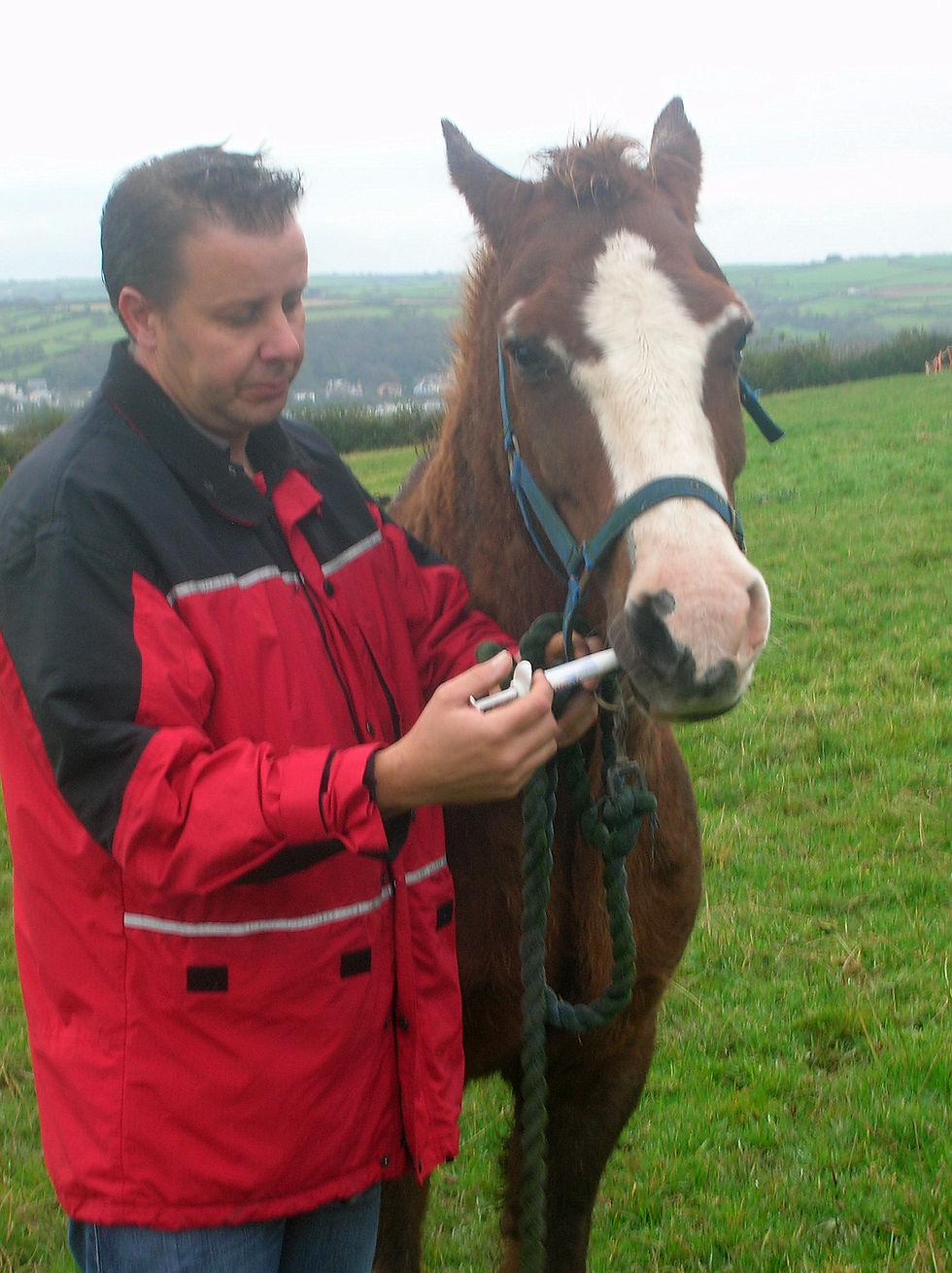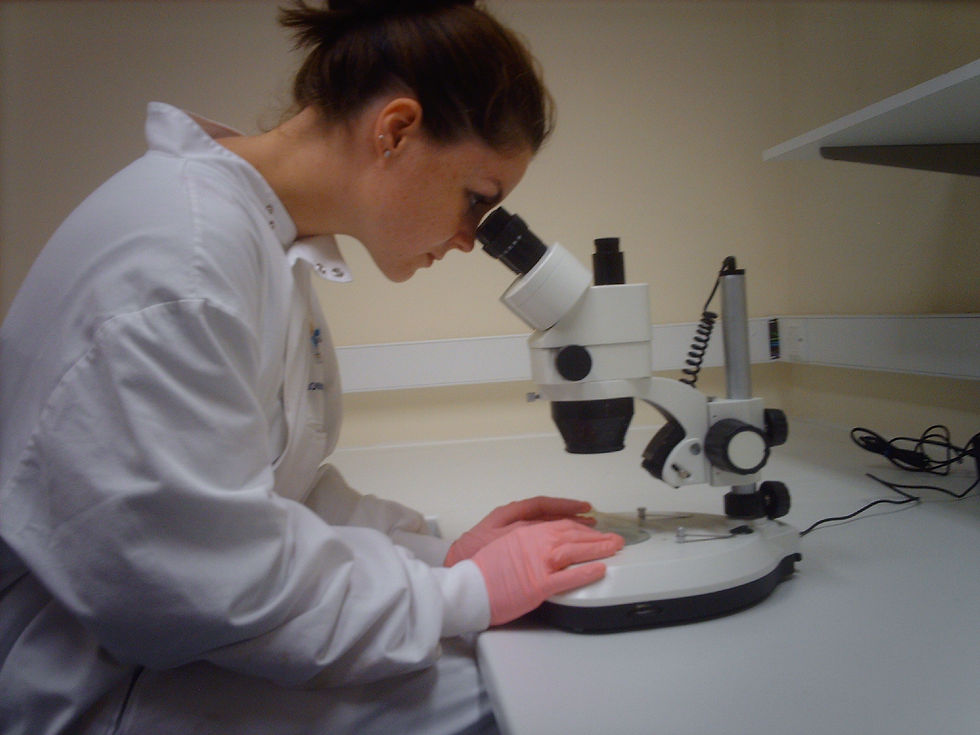Taking the Confusion Out of Worming Your Horse
- Horses Inside Out

- Aug 11, 2025
- 5 min read
If you’ve ever stood in the feed room, wormer in hand, wondering whether you’re doing the right thing, you’re not alone. Modern horse owners are more informed than ever but with that comes a flood of conflicting advice, out-of-date routines, marketing messages, and “heard it at the yard” myths.

One week it’s all about rotating wormers, the next, someone’s saying you shouldn’t worm unless there’s a problem. Throw in acronyms like FEC, resistance, and pasture management plans, and it’s no wonder owners feel overwhelmed when it comes to worming horses.
Where is the line between responsible care and information overload? How can we, as owners, make smart, evidence-based decisions without needing a degree in parasitology?
Helen Coleman from Intelligent Worming helps to break down the confusion surrounding worming horses.
Why Worming Matters and Why It’s Changed
Worming has always been a non-negotiable part of horse care. Parasites like strongyles, tapeworm, and roundworm can cause everything from poor coat condition and weight loss to colic, laminitis, and even death. In the past, the message was simple - worm every few months, rotate products, job done.
In recent years, we’ve learned that over-worming can do more harm than good. Not only does it disrupt a horse’s gut microbiome, but it accelerates anthelmintic resistance - meaning the drugs we rely on to treat worms are becoming less effective, and in some cases, useless.
This is where many owners start to feel stuck. If we’re not supposed to worm routinely, but we also can’t risk a high worm burden, how do we find the balance?

The Rise of Targeted Worming
“Targeted worming” or “evidence-based worming” is now the gold standard approach. Rather than worming by the calendar, base treatments on the actual parasite levels in your horse, using faecal egg count tests (FECs) and, where needed, blood or saliva tests for tapeworm.
It sounds like a win-win. You test, you treat only if needed, and you protect your horse and future wormer efficacy. If only it was that easy! In practice, it’s not quite that simple and throws up questions such as, how often should you test? What about encysted small redworm or bots, which don’t show up in standard FECs? Is it true that some horses always have low counts while others never seem to be clear? And which wormer treats what?
Add in seasonal changes, herd dynamics, new arrivals, risk assessments, pasture hygiene, and it’s no surprise that owners become confused or lose confidence.
Science Without the Jargon
This is where independent advice is so important. While many feed and tack shops, and even social media groups offer worming “tips,” it’s vital to remember that well-meaning advice isn’t always correct and what’s right for one horse isn’t right for all.
Worming is no longer one-size-fits-all. Age, grazing habits, previous history, field hygiene, travel, and even your location can influence what’s best. A weanling on a stud farm needs a different approach than a 14-year-old pony on a private paddock with sheep.
The problem is that so much of the available advice either lacks depth or drowns the reader in confusing and difficult to understand data. For me the goal should be to make the science simple, but not simplistic.
Adding some Clarity
This is where organisations like Intelligent Worming can help. Established by specialists with over 20 years of experience in equine parasitology, they focus not just on testing but on interpreting what that test means for your horse. Their approach isn’t about selling wormers or kits. It’s about making sense of the bigger picture.

One of the most valuable things they offer is perspective. It’s not just about whether a result is “high” or “low.” It’s about what that means in the context of your horse’s immune response, grazing habits, and history. Sometimes, a high count might be less worrying than it seems. Sometimes, a low count might be masking something else entirely.
Most importantly, Intelligent Worming never push unnecessary tests or treatments. In a time where drug resistance is rising fast, that’s more critical than ever.
This is something that Horses Inside Out founder Gillian Higgins knows first-hand. Having used Intelligent Worming for all her horses for many years, Gillian says,
“I’ve always been very happy with what they do. It’s so important to get worming right for each individual horse and Intelligent Worming gives me peace of mind that I’m doing just that.”
Avoiding the Pitfalls
What can horse owners do to stay informed without becoming overwhelmed?
Here are a few practical tips:
Use FEC tests wisely. Regular egg counts (every 8–12 weeks in grazing season) are your first line of defence. But remember, they have limitations - encysted redworm and bots, for example, aren’t picked up in standard tests.
Don’t worm “just in case.” Unless advised for a specific reason (like new horses in quarantine), unnecessary worming can do more harm than good.
Get expert interpretation. A test result on its own means little without context. Work with someone qualified to interpret the data considering your horse’s lifestyle and history.
Review your pasture management. Picking up droppings, rotating grazing, and cross-grazing with other species can reduce reliance on chemical treatments.
Question what you hear. Just because something’s “always been done” doesn’t mean it’s still right. Look for evidence-based sources, not just opinions.
Every horse is different
As a horse owner, we all want to do the right thing. The trouble is the line between under-worming and over-worming can feel razor thin.
However, with the right support and up-to-date knowledge, it doesn’t have to be confusing.
Reliable sources like Intelligent Worming act as a bridge between science and stable, helping owners make confident decisions, protect their horses, and preserve wormer effectiveness for the future.
It’s not about doing more - it’s about doing better.
With a shared mission to make science accessible and equine care more informed, Horses Inside Out is delighted to welcome Intelligent Worming as one of the collaborators for our exciting new online docuseries, The Bare Bones of the Matter. Their contribution to this ground breaking series ensures that parasite control is addressed in depth and with clarity, improving our knowledge and horses’ health.

The Bare Bones of the Matter is an insightful online documentary series that explores the challenges horses face in today's world.

Using her own horse, Freddie Fox and his skeleton as a case study, Gillian Higgins shares his story alongside special guests and top equestrian professionals. This engaging and conversational 7-part series helps horse owners deepen their understanding of their horses' while raising awareness about comfort, movement, welfare, and the best practices for maintaining the highest standards in the equine world.
If you want to explore parasite control without the pressure of hard sales or confusing science, consider consulting educational resources from organisations like AMTRA and CANTER, or explore services like Intelligent Worming, who combine science and experience with a refreshingly practical approach.

Comments